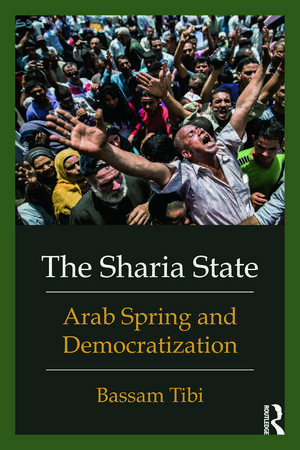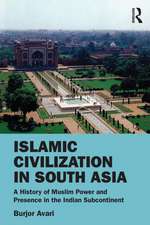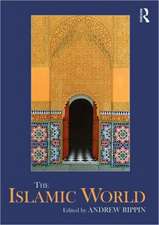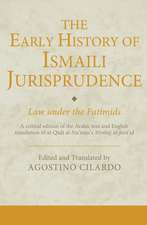The Sharia State: Arab Spring and Democratization
Autor Bassam Tibien Limba Engleză Paperback – iul 2013
In contrast to the prevailing view which sees the Arab Spring as a revolution, this book argues that the phenomenon has been neither a Spring, nor a revolution. The term 'Arab Spring,' connotes a just rebellion that led to toppling dictators and authoritarian rulers, yet in The Sharia State, Bassam Tibi challenges the unchecked assumption that the seizure of leadership by Islamists is a part of the democratization of the Middle East.
Providing a new perspective on the relationship between the Arab Spring and democratization, this book is an essential read for students and scholars of Middle Eastern Studies, Islamic Studies and Politics.
| Toate formatele și edițiile | Preț | Express |
|---|---|---|
| Paperback (1) | 413.33 lei 6-8 săpt. | |
| Taylor & Francis – iul 2013 | 413.33 lei 6-8 săpt. | |
| Hardback (1) | 768.22 lei 6-8 săpt. | |
| Taylor & Francis – 27 iun 2013 | 768.22 lei 6-8 săpt. |
Preț: 413.33 lei
Nou
Puncte Express: 620
Preț estimativ în valută:
79.09€ • 86.18$ • 66.65£
79.09€ • 86.18$ • 66.65£
Carte tipărită la comandă
Livrare economică 23 aprilie-07 mai
Preluare comenzi: 021 569.72.76
Specificații
ISBN-13: 9780415662178
ISBN-10: 0415662176
Pagini: 256
Dimensiuni: 156 x 234 x 20 mm
Greutate: 0.39 kg
Ediția:1
Editura: Taylor & Francis
Colecția Routledge
Locul publicării:Oxford, United Kingdom
ISBN-10: 0415662176
Pagini: 256
Dimensiuni: 156 x 234 x 20 mm
Greutate: 0.39 kg
Ediția:1
Editura: Taylor & Francis
Colecția Routledge
Locul publicării:Oxford, United Kingdom
Public țintă
Postgraduate and UndergraduateCuprins
Introduction 1 The Shari'a- State and Western Scholarship: The Reality of an Islamist Shari'atization of Politics that seeks a name 2 The Shari'a-State is not the Faith of Islam: Shari'a and Politics 3 The Challenge of the Islamist Shari'a-State to the International Order: Torn Between the Westphalian Synthesis, Pax Americana and Pax Islamica 4 Shari'a and Islamism in the Arab Spring: From the Promise of a Blossoming Spring to a Frosty and Lethal Winter 5 From Traditional Shari’a Reasoning to the Islamist Shari’atization in Post-Arab Spring 6 Torn Between Combating Prejudice and the Accusation of Islamophobia: The Shari’a-State and Policing Speech in the Debate on Whither Islamic Civilization.
Notă biografică
Bassam Tibi is a Professor Emeritus of International Relations. Between 1973 and 2009 he taught at the University of Goettingen, and he was A.D. White Professor at Large at Cornell University until 2010. Between 1982 and 2000 Professor Tibi was parallel to Goettingen at Harvard University in a variety of affiliations, the latest of which is the Bosch Fellow of Harvard. His work has been translated into 16 languages, and he has published a great number of books including Islam’s Predicament with Modernity (Routledge, 2009) and Islam, World Politics and Europe (Routledge, 2008). The president of Germany Roman Herzog decorated him in 1995 with the highest Medal/State Decoration for his "bridging between Islam and the West".
Descriere
Set against the backdrop of the Arab Spring, The Sharia State examines the Islamist concept of political order. This order is based on a new interpretation of sharia and has been dubbed "the Islamic state" by Islamists. The concept of "the Islamic state," has been elevated to a political agenda and it is this agenda that is examined here.
In contrast to the prevailing view which sees the Arab Spring as a revolution, this book argues that the phenomenon has been neither a Spring, nor a revolution. The term ‘Arab Spring,’ connotes a just rebellion that led to toppling dictators and authoritarian rulers, yet in The Sharia State, Bassam Tibi challenges the unchecked assumption that the seizure of leadership by Islamists is a part of the democratization of the Middle East.
Providing a new perspective on the relationship between the Arab Spring and democratization, this book is an essential read for students and scholars of Middle Eastern Studies, Islamic Studies and Politics.
In contrast to the prevailing view which sees the Arab Spring as a revolution, this book argues that the phenomenon has been neither a Spring, nor a revolution. The term ‘Arab Spring,’ connotes a just rebellion that led to toppling dictators and authoritarian rulers, yet in The Sharia State, Bassam Tibi challenges the unchecked assumption that the seizure of leadership by Islamists is a part of the democratization of the Middle East.
Providing a new perspective on the relationship between the Arab Spring and democratization, this book is an essential read for students and scholars of Middle Eastern Studies, Islamic Studies and Politics.



















